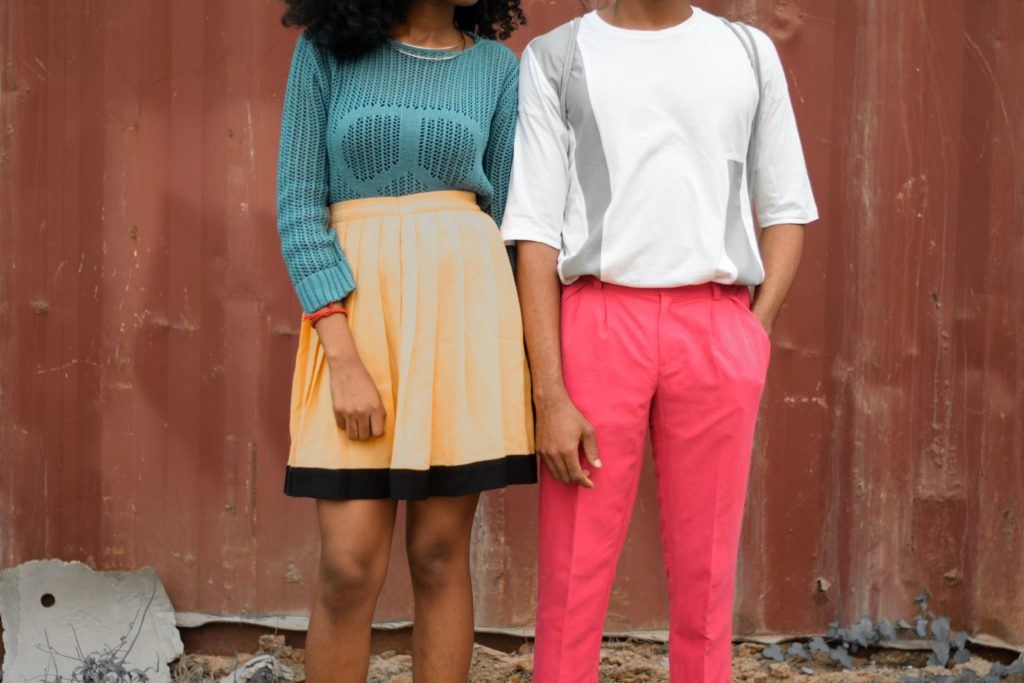
Please note (TW): Intermittent reinforcement is often a tactic used in abusive relationships. The following article will mention forms of emotional abuse in relationships. It is also worth mentioning that I am in no way a psychologist; I’m just someone who’s struggled with intermittent reinforcement in relationships before, and wanted to share my story in case it could help someone.
Last updated: November 18th, 2023
I met Dylan in a sandwich shop on a snowy afternoon in Toronto. With a charming accent and a mop of brown curls, I was instantly smitten. Lunch after lunch, even though it cost a fortune, I visited the sandwich shop for a chance to speak to the handsome man who worked there.
After six weeks, he finally asked me out. From then on, things happened fast: we became boyfriend and girlfriend, moved in together, and planned a future living in another country, all within the span of six months or so. It was my first truly serious relationship – I was 22 – and I was so excited to finally have someone to introduce to friends and family, to plan out holidays with, and to share my life and all its ups and downs.
And although Dylan and I stayed together for nearly three years, lived in three countries together, and even discussed marriage and children, I always had a worrying thought lingering in the back of my mind: I don’t think Dylan is very nice to me. In fact… I think Dylan is really, really mean to me most of the time.
I didn’t understand why I thought that: didn’t Dylan bring me flowers? Didn’t we have the same goals in life? Didn’t we laugh until our stomachs hurt? Didn’t he play romantic songs for me? Didn’t he tell me I’m beautiful? Didn’t he call me the love of his life?

It was only years later, well into my thirties, that I understood the emotional roller coaster of the relationship with Dylan. I finally recognized the hot and cold, the sweet and the sour, the constant desperation for attention and the incredible relief that followed when he finally said or did something kind.
I can look back and see just how clearly it was an example of intermittent reinforcement in a relationship. It took me a long time to get here, but once you understand what intermittent reinforcement is, and how it might affect your relationship, I knew that I would never again stand to be in another relationship like it.
What is intermittent reinforcement?
I’m not going to lie, I sometimes feel like a phony writing about dating and relationships, because in the grand scheme of things, I haven’t been in very many good ones. For most of my twenties, I was in relationships that always seemed so dramatic; these relationships were defined by very high highs (think travelling the world together, watching sunsets on foreign beaches) and very low lows (think being cheated on, or being ghosted after three months, or pining for someone who didn’t treat me very well at all).
While I now take accountability for my actions in those scenarios, I do recognize that I dated a few men who used intermittent reinforcement, whether or not they understood what they were doing.
So what is intermittent reinforcement, and how could intermittent reinforcement be affecting your relationship?

Intermittent reinforcement was widely established in behavioural psychology when psychologists C.B. Ferster and B.F. Skinner published their book, Schedules of Reinforcement, in 1957. In that revolutionary work, their findings proved that organisms – everything from rats to people – could be reinforced using different schedules, and that those schedules would produce different behavioural outcomes.
We all know how reinforcement works. When we’re trying to train our dog, for example, we use positive reinforcement. You say sit, the dog sits, and the dog gets a treat. The dog soon learns that if she sits, she’ll get a treat. Ergo, she sits when you ask her to sit.
But here’s where it gets interesting: continuous positive reinforcement often leads its subjects to grow bored. B.F. Skinner discovered that rats pressed a lever for treats more consistently when the rat didn’t know whether or not a pellet would be produced. Isn’t that wild? The rat became more obsessed with pressing the lever when it didn’t know the outcome, even more so than when it always knew it would get a treat.
We see this all the time, of course: one only needs to think of a slot machine or even a game of solitaire to know that we love taking our chances again and again, even if we’re not sure we’re going to win anything at all.

But why am I talking about dogs and rats and slot machines? Because intermittent reinforcement – that is, when rewards are given out inconsistently and infrequently – is an extremely powerful tool of manipulation. It is used constantly in abusive relationships, and it has the ability to make someone feel bonded to the person who is emotionally abusing them.
Intermittent reinforcement is all around us, and chances are, we’ve maybe even been in a relationship where it was used.
A romantic dinner after a frightening bout of rage.
Flowers and compliments after an evening of name-calling.
Sending you a playlist of your favourite songs after days of ignoring your calls and texts.
Telling you you’re the love of their life the day after telling you that they’re embarrassed to be with you.
The three years I spent with Dylan were fraught with ups and downs. He would scream at me, throw my belongings out the window, slam his fist into the wall beside my head. He’d call me stupid, ugly, fat, worthless, tell me I was lucky to have him because nobody else in their right mind would ever date me. He’d get drunk and fly into uncontrollable rages, even once flipping a marble table and breaking my friend’s foot in the process.
But he was so cute! And people liked him! And he was so great with kids! And he’d bring me flowers and chocolate and watch my favourite show with me and call me sweet nicknames and talk about our future kids and do silly dances and cuddle and, and, and…
I felt like I was constantly playing the game of “he loves me, he loves me not”.
Intermittent reinforcement has the ability to manipulate us into thinking that the relationship could be so, so good all the time – that we could always have those romantic dinners and flowers and compliments and silly dances and cuddles – if only we figured out what we had to do to consistently deserve them. To be hot and cold toward someone? It is one of the ultimate ways that someone can manipulate you. Deep down, you probably know this person isn’t right for you. But these kinds of control tactics can cause even the strongest of us to keep fighting for the relationship.

When I was with Dylan, I was constantly pressing the lever, hoping for that treat. I’d wear the dress he liked. I wouldn’t bring up my differing opinions. I’d cook his favourite meals. I’d never hang out with my friends without him. I’d keep the apartment as tidy as I could. I’d suppress my tears and my anger and my heartbreak, putting on a smile even after he’d tell me the meal I made had too much spice (“You ruin everything”), or that he didn’t like the way I made the bed (“You’re so useless”), or that dress he used to love is now making me look fat (“Frankly, I’m embarrassed to be seen with you looking like that”).
There is a lot of talk of cycles when it comes to abuse, a continuous loop of rage and manipulation that’s often followed by loving behaviour. When we’re the victims in that abuse cycle, we’re desperate to get back to the loving part of the pattern, the “honeymoon phase” if you will. We’ll do anything to get there, addicted to the hope that we’ll get a reward if we only work hard enough at the relationship.
Lever, no treat. Lever, no treat. Lever… oh! Today he told me I looked nice. “See?” I’d tell myself. “He really is a good guy. He really does love me.” It’s as if I was gaslighting myself into believing I was overreacting, that I had blown his emotional abuse out of proportion. I’d cling to any sign of kindness – even a pretty standard text from him like, “How is your day going?” – and try to use it to negate all the awful things he said and did to me. I turned into an incredibly insecure, anxious person, and unfortunately that carried through most of my relationships in the following decade.

Why is intermittent reinforcement so dangerous in relationships?
It should be obvious by now, but intermittent reinforcement is not healthy in relationships. The hot and cold thing? Nobody wants that in the long run. Sure, maybe the highs are indeed very high, but at what cost? An abusive relationship, whether it is physical or emotional, is not a healthy relationship. Period.
And sadly, part of this abuse is that we begin to believe that we really are pretty worthless. To this day, I struggle with feeling like I’ll never be chosen, because Dylan was right: who would ever want me? That kind of emotional abuse can have long-lasting effects.
Scarily enough, when I googled intermittent reinforcement, I came across a lot of websites that promote it as a powerful dating tool to get anyone you want to fall in love with you:
Be incredibly nice to her, and then don’t call her for a week. Tell him he’s the most amazing man you’ve ever met, but then tell him you’re not sure if you want a relationship with him. And so on.

These are all examples of using intermittent reinforcement to confuse and manipulate the person so that they work even harder to please you. Remember: these are examples some websites give when you actually DO want to be in a relationship with the person. These same websites recommend negging (when a person makes a backhanded remark in order to undermine their confidence and increase the desire to have the person’s approval) as well as a host of other pretty despicable dating “tips” for pick-up artists. It’s the oldest game in the player handbook: play hard to get. Ignore them, and they’ll fall in love with you. Give them reinforcement sporadically, and they’ll be begging for more.
We see intermittent reinforcement in movies and other media all the time. Person A treats Person B terribly even though they secretly love and care about them. They tease, annoy, and belittle, but in the end, they are seen riding off into the sunset together.
I mean… if you want to live your life manipulating people’s emotions and CONFUSING THEM INTO LOVING YOU, I have nothing but pity for you, because you’re a piece of shit. Personally, I’d rather, oh I don’t know, be nice to each other and learn about each other a lot until we fall in love, not having to resort to trickery and drama that will only lead to unhappiness and an eventual breakup…? No? Just me? I can’t be the only one looking for something straightforward!
So, what do you do if you’re in a relationship with intermittent reinforcement?

If you feel as though you’re in a relationship with someone who is using intermittent reinforcement against you, whether they’re aware of it or not… firstly, I am so sorry. It is awful, and painful, and heartbreaking. I know what it feels like to try so hard to make things better, to feel in constant fear of saying or doing the wrong thing, to not understand why they can be so terrible to you one day and so loving the next. I know what it feels like to be so incredibly uncertain of how my partner feels about me, even when he’s lying next to me at night in our own bed in our own home.
For me, the first step to getting out of the relationship with Dylan was talking to people about it. I stopped hiding the truth from my family and friends, and started to tell them honestly what was going on. They had already started to suspect it, of course; they had witnessed it often. To finally express myself and tell my loved ones what was going on made it easier to imagine a life without him.

Similarly, I strongly encourage reaching out to a therapist; I see a therapist to work through past issues such as this one, and it helps immensely. A therapist can help you work through the realities of your emotional abuse, and can help ground you. The first time I saw my therapist and talked about the issues I’d had in past relationships, she looked at me with utter sincerity and said, “Wow, that must have been so difficult.” She told me I had every right to be angry, and every right to feel sad, and every right to have it still affect me, even ten years later. It was such a relief to hear someone say that to me, and I continue to swear by therapy.
In the end, I can’t tell you whether or not you should break up with your partner, but I can tell you this: you deserve so much better. You deserve to be loved fully, and to love fully back. You deserve to feel free to express yourself without fear. You deserve someone who wants the very best for you, someone who won’t play games or manipulate you. You deserve someone who regularly tells you or shows you that you are worthy, and admired, and respected, someone that doesn’t confuse you or leave you feeling constantly uncertain and insecure. And yes, you deserve someone who brings you the damn flowers just because you’re awesome, not as an apology.

In the end, after years of dealing with the uncertainty, I broke things off with Dylan. I finally got the confidence to end the relationship, and I told him exactly why I was doing it: I was too tired of the emotional abuse. Too tired of never feeling good enough, or pretty enough, or intelligent enough, or capable enough. Too tired of wondering what I could do to be “better” in his eyes, to gain his approval. Too tired of never knowing what I’d get if I pressed the lever.
His response? He threw a massive tantrum that included throwing books at me, ripping everything out of the closet and dresser drawers, and then sobbing uncontrollably in a ball on the floor. And then, in the ultimate move of intermittent reinforcement – the ultimate reward – he proposed. Yep. I took my suitcase and left.
Over the next few months, Dylan tried everything to get me back: he sent emails to my friends and family, he wrote love letters, he was dripping with charm and compliments whenever I ran into him. One night, out with a group of friends, I ran into him at a bar. He asked me to dance. I told him that I had just met someone else. He took his beer and dumped it over my jacket and purse. Needless to say, he hadn’t changed, and I had finally moved on. All these years later, Dylan still sometimes writes to me to tell me how sorry he is that he treated me so badly (I have never responded).
It may feel like you’ll never break the cycle of intermittent reinforcement in your relationship. Or that today was a good day, so maybe tomorrow will be good, too. Again, I can’t tell you whether or not to break up with someone. But I can tell you that there is so, so much more out there. That there is love that doesn’t have to come with pain and confusion. That – trust me on this – there will be someone who will bring you the treat without you even having to push the lever.
Want to read more about relationships? Check out How to Get Over a Tough Breakup or This is Why You Can’t Stop Thinking About Them. I also have an article on Love Bombing and how to avoid it in relationships.

I am fully aware that I have not touched on violent relationships, as I do not feel that I have the knowledge to write about this topic. I also understand that abusive relationships can be very, very dangerous and frightening. If you are in an abusive relationship of any kind, I urge you to reach out to a helpline if it is safe for you to do so. Here is a list of domestic abuse hotlines you can contact, including USA, UK, Canada, Australia, and more. You are not alone, and there are people who want to help you.

26 comments
Beautiful post, Brenna. I’m so sorry you went through that. There are a lot of people who could benefit from reading this — and the part about the dating websites encouraging it? That’s shocking!
I was fortunate to find a kind man when I was only 20… and we’re still together today, nearly two decades later. And I will say that I’m really realizing now how much that last part you wrote is so important — not just in a relationship with your partner, but in a relationship with yourself: “But no matter what, there is respect. There is kindness. There is an understanding that we are in this together, and that we love each other very much. There is security that he has my best interests at heart, and that I have his.” <–
Sometimes I don't like myself very much. And that is reflected in how I treat my partner. It's something I need to work on, and something we all need to remember. How you feel about yourself can have even more impact on your relationship with your partner than how you feel about each other. Something to keep in mind as you potentially begin to spend a lifetime with this one. 🙂
This is a great post. I am so happy you dumped Dylan and now you have a good man who appreciates your beauty, talent and love. Bravo! And thank you for writing about this. I too am a big believer in therapy and reaching out to family and friends. Much love to you! Keep doing what you do!
Thank you so much, Emna, that means so much to me!
Thanks Brenna, I’m so glad I found your post, I have been married for 37 years, married at 18..I think for most of my marriage I have been in this situation, hot and cold always with huge fights . I am having weekly therapy and have now just come to realise what is happening to me.. I feel I have lost myself and confidence, it has been making me feel like I’m the crazy one for wanting a connection. I am currently still in the relationship but I am really becoming more aware daily, it feels like torture but I seem to go back for more and take his apologies until the next time. I know I will know it when I’ve had enough… getting closer to that point now.
Thank you for your honesty ..
Warm regards
Janelle
I’m so sorry for not responding sooner, Katie! Thank you, as always, for your insightful comment. “How you feel about yourself can have even more impact on your relationship with your partner than how you feel about each other.” I love that, and it’s part of the reason I’m still seeing a therapist to work through the issues I still have with past relationships (and with myself). I’m so happy you’re in such an amazing relationship… I love seeing your family updates online! xoxo
I’m so sorry that this happened to you. I had never really thought about the science behind people acting hot and cold, but it is super interesting. Thank you for sharing your story, even if it was painful to do so!
Aw, thank you so much, Sophia!
I went through one of these relationships and it’s so entangled with guilt over the time my mum passed away because I was so focused on getting the recognition from the guy who really treated me like sh&$ when he should have been my number one support base. I’ve also started therapy to make sure I can leave this is in the past and not end up in the situation again ever!! Thanks for sharing the article and your experience
Oh man. I’m so sorry that this happened to you, Tessa! That sounds awful and you shouldn’t have had to deal with any of that 🙁 Thank you for sharing your story here xo
This is a great article, thank you for sharing. I suppose I knew what intermittent reinforcement was but I never thought about the science behind it, and why it (sadly) works so well. Another fantastic read from you, keep them coming!
Thank you so much, Gillian, I’m so glad that you enjoyed the post 🙂
My one abusive relationship – emotional and mental, but not physical – ended with the same “I was just about to propose. Had a ring”. Looking back I can see just how many red flags I ignored for so long.
It’s amazing how many red flags we just don’t see until we’re out of the relationship…
Thank you so much for writing this. You have no idea what it means to me.
Thank you so much, Heather xo
This post on Intermittent Reinforcement in Relationships was such an informative read, Brenna. I love how you continually make me think about (and understand) situations that were, until now for me, unnamed. I’m so sorry you had to experience this, but it’s clear that you learned so much and moved forward from it gracefully and wisely, and are now reaping the rewards of a wonderful partnership!
Aw, thank you so much mama. I’m so happy that I always have you in my life to talk things over with! xoxo
have you read Attached by Amir Levine and Rachel Heller? I think it’s right up your alley and mentions similar issues. It talks about the three different “attachment styles” and intermittent reinforcement is a big red flag for the “avoidant” attachment type!
I LOVE that book!!!! It honestly changed my life, and I credit it with being in a happy relationship today. I’m actually writing a blog post all about it! So cool that you know it, too 😀
Hello Breena I discovered your blog 2 days ago and I read all the articles of romance reminds me quite a lot of my own experiences as a solo traveller myself.
I am happy to read that you are now in a healthy relationship.
Wish you will post about it in the future.
greetings from Paris ,France .
Is there anyway to break the cycle so you can still be with that person or will they never change?
Wow, it almost feels as if men do this on purpose to keep women trauma Bonded. I hope Dylan’s member falls off in front of him
This made me cry. Your writing is brave and I feel grateful for it. Thank you.
Aw, I’m sorry for making you cry, Cole. Thank you so much for your comment 🙂
Sounds like Dylan had a personality disorder. It sounds very reminiscent of Borderline Personality Disorder, which is hell on Earth for everyone involved, especially the person with it. Been there, done that. Glad you got out.
The next time he writes to apologize, maybe respond. You don’t have to accept his apology or forgive him; just let him know that you saw it, wish him well. Accepting his apology and forgiving him might bring you some closure. Telling him to stop messaging you and to move on might do you some good too.
I just feel that ignoring someone is a little cruel.
I really don’t feel I owe him anything after years of emotional abuse, nor do I think it’s cruel to not want to engage with him further. I’m happy and have moved on with both time and therapy, so don’t need to accept his apology for closure. I got my closure on my own, and I certainly have no desire to help him find his.
Personally, I strongly support ignoring those who have been emotionally abusive. Once we’ve moved on and feel strong again, there is no reason to open that door again, especially as it can often lead to further abuse/regressing in progress.